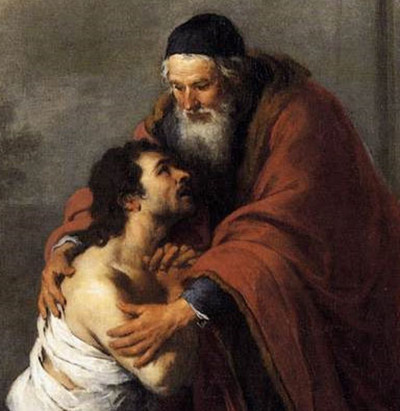Jesus was always being confronted by those who complained that He welcomed sinners and ate with them. The story of the prodigal son is so poignantly clear as to leave no doubt in our minds as to why he does so. The son deliberately leaves his father's house and rejects his father's love. He offends contemptuously. He revels in his disobedience until pangs of hunger trigger pangs of guilt and remorse. Sorrow for sin leads him home ready to be disowned as son even if he can only stay on as servant.
 But there is a twist in the story. Not only was his father not angry and resentful, he was watching and waiting. He ran out to meet his wayward son, embraced him, kissed him, and welcomed him. There was no scolding, no threats, no demands - only a robe, a ring and a celebration! When the other son objected about his father's gift of prodigal forgiveness, he heard very simple, moving words: "This brother of yours was dead and has come back to life, he was lost, and is found."
But there is a twist in the story. Not only was his father not angry and resentful, he was watching and waiting. He ran out to meet his wayward son, embraced him, kissed him, and welcomed him. There was no scolding, no threats, no demands - only a robe, a ring and a celebration! When the other son objected about his father's gift of prodigal forgiveness, he heard very simple, moving words: "This brother of yours was dead and has come back to life, he was lost, and is found."
This parable goes by a variety of names: "the lost son", "the forgiving or loving father", "the prodigal son". And we have heard it repeated, over and over, every year since we were children. At one time or another in our lives we have identified with the younger son returning home to God and begging forgiveness, only to find Him waiting with tears of joy and excitement, embracing us with open arms. At other times, we can identify quite readily with the older son, struggling every day to live a good life, mumbling and grumbling and wondering how God could be so blind to all the good that we do.
Yet I think there is much more to the story than just that. If you look up the word "prodigal" in the dictionary, you'll find a number of definitions: "luxuriant," "yielding abundantly," "recklessly extravagant," to name a few. In my mind, these words better describe the actions of the father more than they do those of the lost son. The Love of God for us is indeed "reckless." It is quite luxuriant and extravagant and it is so wonderfully abundant. He could very well demand punishment and penalty for our faults and failures, but rather holds us all the more dear.
But forgiveness is only part of the story. Of course, Jesus is speaking about our need for forgiveness. But we are also called to emulate the Father. We are called to be just as forgiving, just as all-embracing and just as radical in loving. Repentance leads to forgiveness and forgiveness leads to joy-filled reconciliation.
Jesus tells a story about a lost son, a faithful son and a loving father. It is a story of failure, repentance, forgiveness, of joy and reconciliation. It is a story of "letting go" and "making room." It is a story of a father and his sons (and daughters!) spending time together on a great journey, and emerging with a stronger relationship with one another.
There is no more important lesson for us to learn as followers of Jesus - that of giving and accepting of forgiveness. It is a matter of being totally, unconditionally and recklessly in love with our God.
If we haven't learned that, we really haven't learned the meaning of being Christian.
Reflection for Fourth Sunday of Lent - Cycle A




